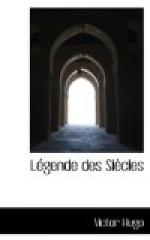Yet it would be a mistake to suppose that no general conception of the history and destiny of mankind is to be found in the work, or that the author had no sense of an increasing purpose running through the ages. The conception is no doubt that of a poet and a seer, not of a historian or a philosopher, but it is clear and vivid, and is expressed with Titanic force. Hugo pictured the history of mankind as a long struggle upwards towards the light. Man has in all ages been oppressed by many evils—by war, by tyranny, by materiality, by mental and moral darkness. He has sinned greatly, he has suffered greatly; he has been burdened with toil and surrounded by shadow, tormented by his rulers and misled by his priests. Paganism was merely material; Rome was strong, cruel, and repressive; ‘a winding-sheet of the nations,’ he calls her in Changement d’Horizon[2]; Judaism, his view of which must be sought rather in Dieu than in the Legende, cold and harsh, could influence man only by keeping him within the strait-waistcoat of a narrow law; the life of the founder of Christianity was only a momentary gleam of light in the darkness; the Middle Age was a confused turmoil of rude heroism and cunning savagery; the Renaissance a relapse into heathenism and the worship of nature. Yet with the modern ages comes a rift in the blackness; the poets reveal a new spirit; their songs are the songs of peace and not of war:
Le poete a la mort dit: Meurs, guerre,
ombre, Envie!—
Et chasse doucement les hommes vers la
vie;
Et l’on voit de ses vers, goutte
a goutte, des pleurs
Tomber sur les enfants, les femmes et
les fleurs;
Et des astres jaillir de ses strophes
volantes;
Et son chant fait pousser des bourgeons
verts aux plantes;
Et ses reves sont faits d’aurore,
et dans l’amour,
Sa bouche chante et rit, toute pleine
de jour.
(Changement
d’Horizon.)
[Footnote 2: For a fuller development of this view see La Fin de Satan: Le Gibet, I, i.]
Gentleness and humanity are the characteristic virtues of the later age. It is a mistake to suppose, as some have done, that such pieces as Le Crapaud, Apres la Bataille, and Les Pauvres Gens have no connexion with any epoch. In Hugo’s view, that tenderness for the weak and the defenceless which is their keynote was the peculiar mark of the age in which he lived, and a foretaste of the glory that was to come. For the great purpose which his reading of human history reveals to him is the increase of the love of man to man, the widening of the bounds of liberty, the growth of brotherly feeling. Suffering and oppression behind, freedom and joy in front, so does Hugo’s imagination picture world-history, and his love of violent antitheses made him paint the past in the darkest colours in order that his vision of the future might shine with the greater radiance.




